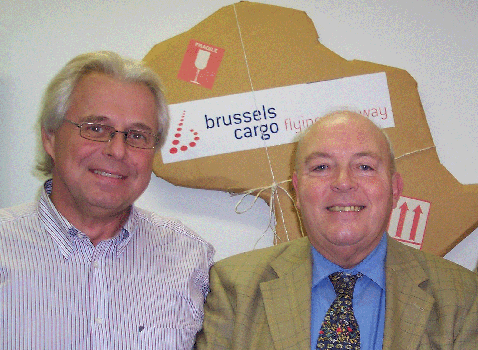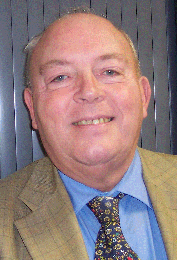Hardy
Guy Goodbye

Brussels
Airlines’ head of Cargo Sales, Guy Hardy, (above right) is retiring
at the end of December after 40 years in the aviation industry, mainly
the air freight biz. A true veteran of the aviation industry is saying
farewell.
Herman Hoornaert (above left) will succeed
him as Cargo Sales Manager as of January 1, 2011. Air Cargo News FlyingTypers
was given the opportunity to conduct a final interview with Hardy.
 FT:
What was the most memorable occurrence
you experienced in your entire career? FT:
What was the most memorable occurrence
you experienced in your entire career?
GH:
I became Head of Cargo at Brussels Airlines right after the creation of
this new airline, replacing Sabena, in early 2002.
The three most memorable occurrences that
I experienced were:
•
Genocide in Rwanda between April and July 1994
•
The grounding of Sabena’s major stakeholder Swissair
in October 2001 because of unpaid fuel bills
•
The resulting bankruptcy of Sabena in November 2001
FT: Speaking
of Sabena’s vanishing: How did you personally perceive the last
weeks and days of your former employer?
GH:
In 2001 I was based in Shanghai where I got the news about the end of
Sabena. I was able to follow the final days of Swissair and its subsidiary
Sabena very closely on Belgian and Swiss cable TV in Shanghai.
No need to stress that this was a very sad
period of my life after having spent many years with the Belgian carrier.
The grounding dragged me down; I was crying for two days. To my understanding,
the Belgian government did not do enough to save Sabena. What a shame!
FT: What
key lessons did Brussels Airlines learn from the failure of its predecessor?
GH:
The main difference in strategy between Sabena and Brussels Airlines is
that almost all activities, except for sales, are outsourced now, while
at Sabena, all activities were kept in house.
Of course, the fact that Brussels Airlines
is now a member of the LH group and Star Alliance is certainly a sign
of a healthy airline.
FT: So
far your cargo division is doing an extremely successful job, especially
in sub-Sahara Africa. Recently, however, Qatar Airways, Emirates, Etihad,
and some others are increasing their activities there dramatically. What
is your response to these newly emerging competitors?
GH:
It is true that QR, EY, and EK have discovered Africa, but since 95 percent
of our inbound cargo is of time sensitive nature (perishables), we don't
believe that this traffic will be diverted via their hubs in the Gulf
area. With regard to southbound sales to Africa, we closely monitor their
strategy & behavior.
FT: SN
Cargo has become part of the Lufthansa Cargo group. What benefits and
perhaps problems result from this process for SN’s air freight division?
GH:
Together with Jade International, Swiss WorldCargo, Austrian, AeroLogic,
BMI Cargo, and LH Cargo Charter, Brussels Airlines Cargo is now a full-fledged
member of the LH Cargo Group. Several working groups have been set up
to evaluate potential synergies and cost saving measures, be it multilateral
or bilateral. For Brussels Airlines Cargo, the benefits are obvious in
the following fields: handling, trucking, interlining, marketing, ULD
provision, networking, business & market information exchange etc.
The LH Cargo Group Executive Committee considers
Brussels Airlines Cargo the 'African Pillar' with a separate sales organization
and business model.
FT: With
your upcoming retirement, the cargo industry is losing one of its true
veterans. Asking you very personally – would you enter the air freight
arena again if you were a youngster today, or rather seek your fortune
in other industries?
GH:
Since I did both, I don't want to make a distinction between passenger
and cargo business. I have never considered any other industry because,
quite simply, the airline virus creeps through my veins at a never-ending
pace.
FT: What
key message would you like to deliver here and now to the fellow members
of this great industry?
GH:
The years ahead will not be easy for the air cargo industry, which faces
two major challenges, namely E-freight and security issues. However, I
am sure that with all the creative minds around, proper solutions will
be found in due time.
FT: Finally,
what are your major plans for your time after January 1, 2011?
GH:
During the first three months, I will clear my head and spoil my wife,
who supported me throughout my career, which was not always easy, considering
the African circumstances.
Traveling across Europe (by car) is also
on my agenda, together with polishing my golf handicap. Perhaps emigrating
to Thailand, my wife's country of birth…
FT: ACNFT
wishes you and your family happiness, success and all the best for 2011
and the coming years.
Thank you for giving us this final interview while still being on duty
at Brussels Airlines.
Heiner Siegmund/Flossie
|




